Auditing: Factors Influencing Audit Service Quality & Ethics
VerifiedAdded on 2023/06/09
|9
|2511
|374
Report
AI Summary
This report provides a comprehensive analysis of the factors that influence the quality of audit services, which are crucial for ensuring the reliability and accuracy of financial statements. It begins by defining an audit as an independent examination aimed at expressing a true and fair opinion on an entity's financial statements, emphasizing the role of Chartered Accountants in performing this function. The report identifies several key factors affecting an auditor's ability, including judgment, honesty, and competence. It discusses the importance of verifying internal controls, ensuring proper documentation, classifying expenditures correctly, and validating asset values. Furthermore, the report delves into the inherent limitations of audits, such as reliance on management's judgment and potential limitations in obtaining complete information. It outlines essential strategies for auditors, including developing an overall audit strategy, documenting the audit plan, creating an audit program, and executing the audit effectively. The report also examines specific factors like firm size, industry expertise, auditor tenure, auditor fees, auditor independence, auditor qualification, and internal control systems, highlighting their impact on audit quality. The conclusion emphasizes that both external and internal factors significantly affect audit quality and that adhering to auditing standards and legal requirements is essential for maintaining the integrity of the audit process. Desklib provides students access to similar solved assignments and past papers.
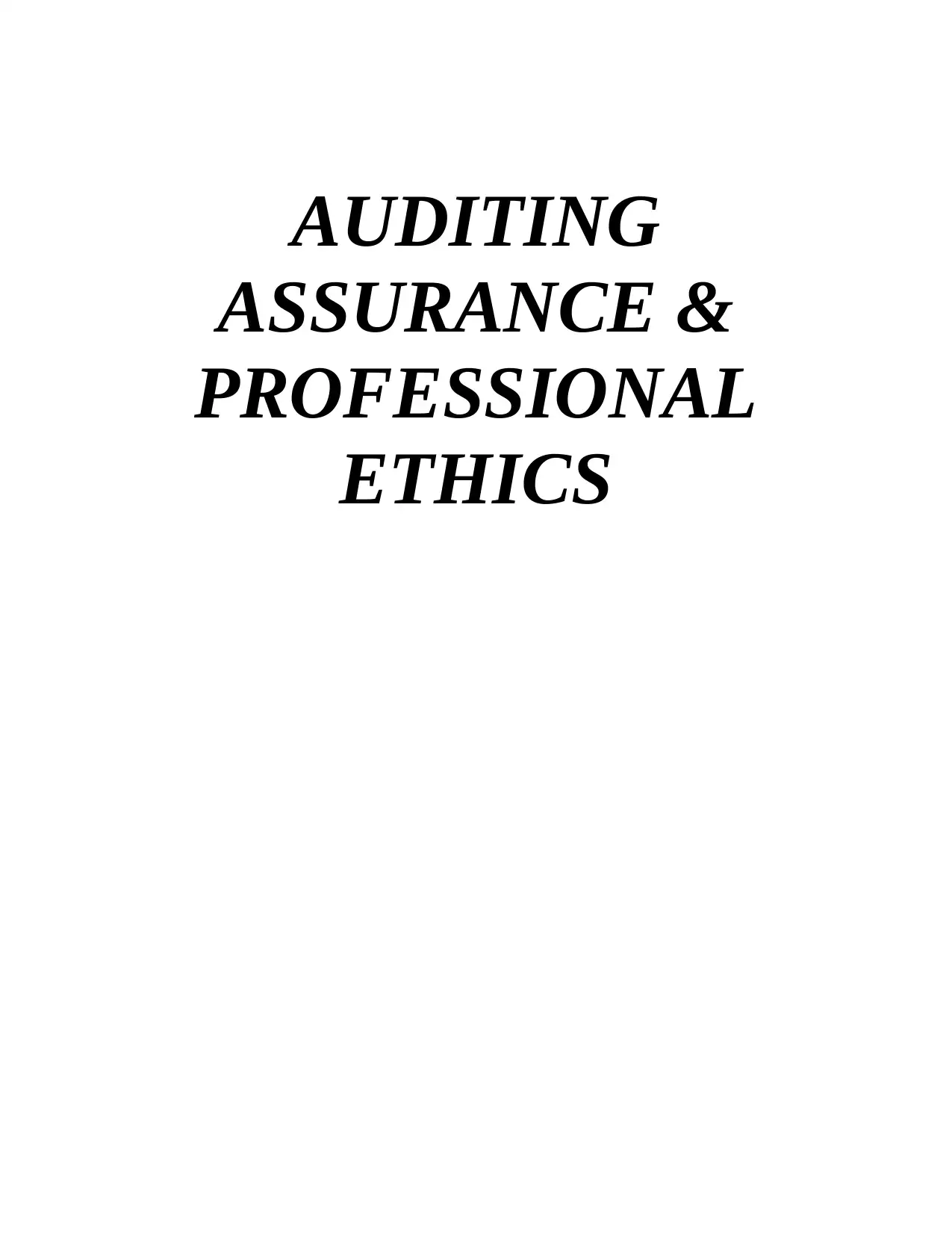
AUDITING
ASSURANCE &
PROFESSIONAL
ETHICS
ASSURANCE &
PROFESSIONAL
ETHICS
Paraphrase This Document
Need a fresh take? Get an instant paraphrase of this document with our AI Paraphraser
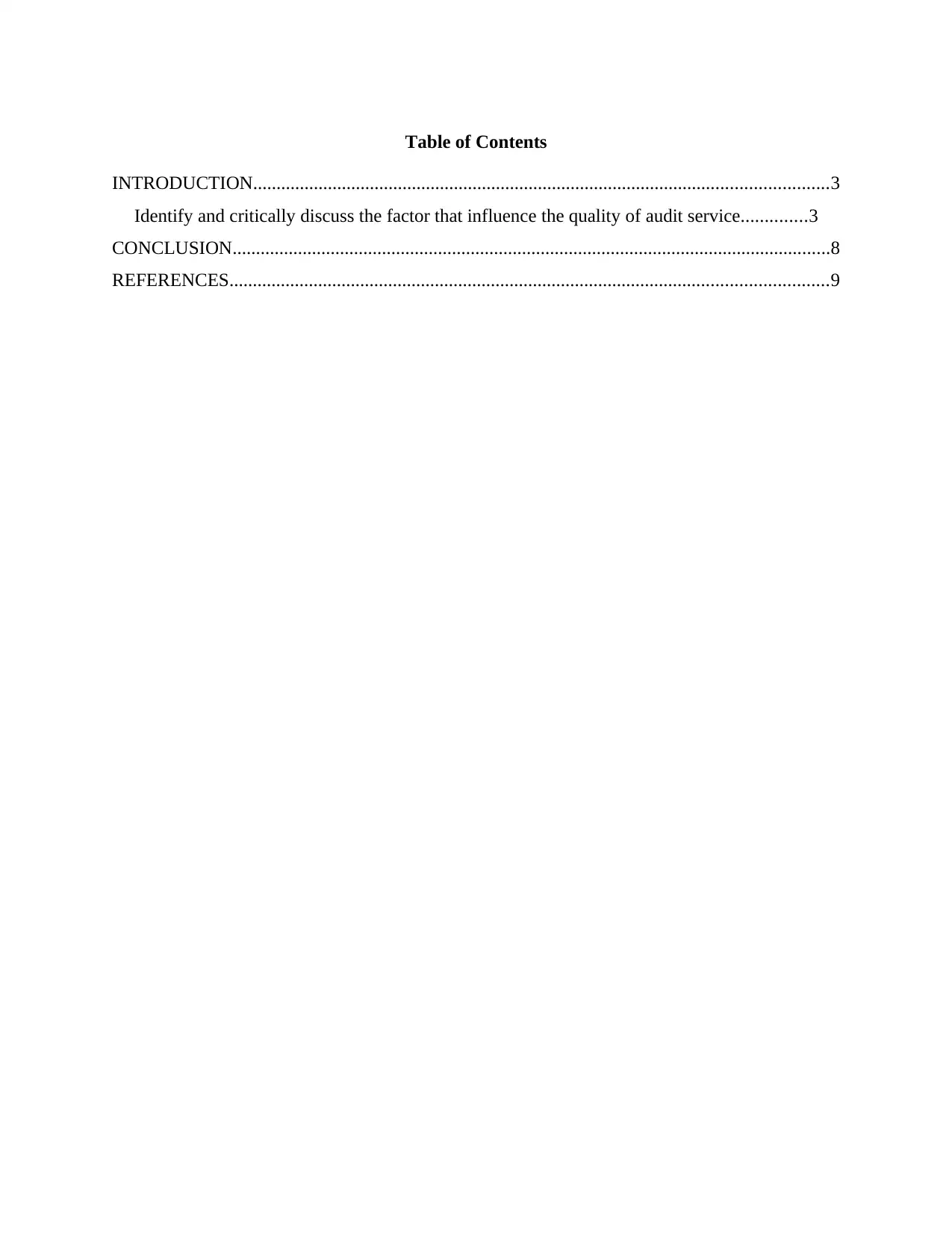
Table of Contents
INTRODUCTION...........................................................................................................................3
Identify and critically discuss the factor that influence the quality of audit service..............3
CONCLUSION................................................................................................................................8
REFERENCES................................................................................................................................9
INTRODUCTION...........................................................................................................................3
Identify and critically discuss the factor that influence the quality of audit service..............3
CONCLUSION................................................................................................................................8
REFERENCES................................................................................................................................9
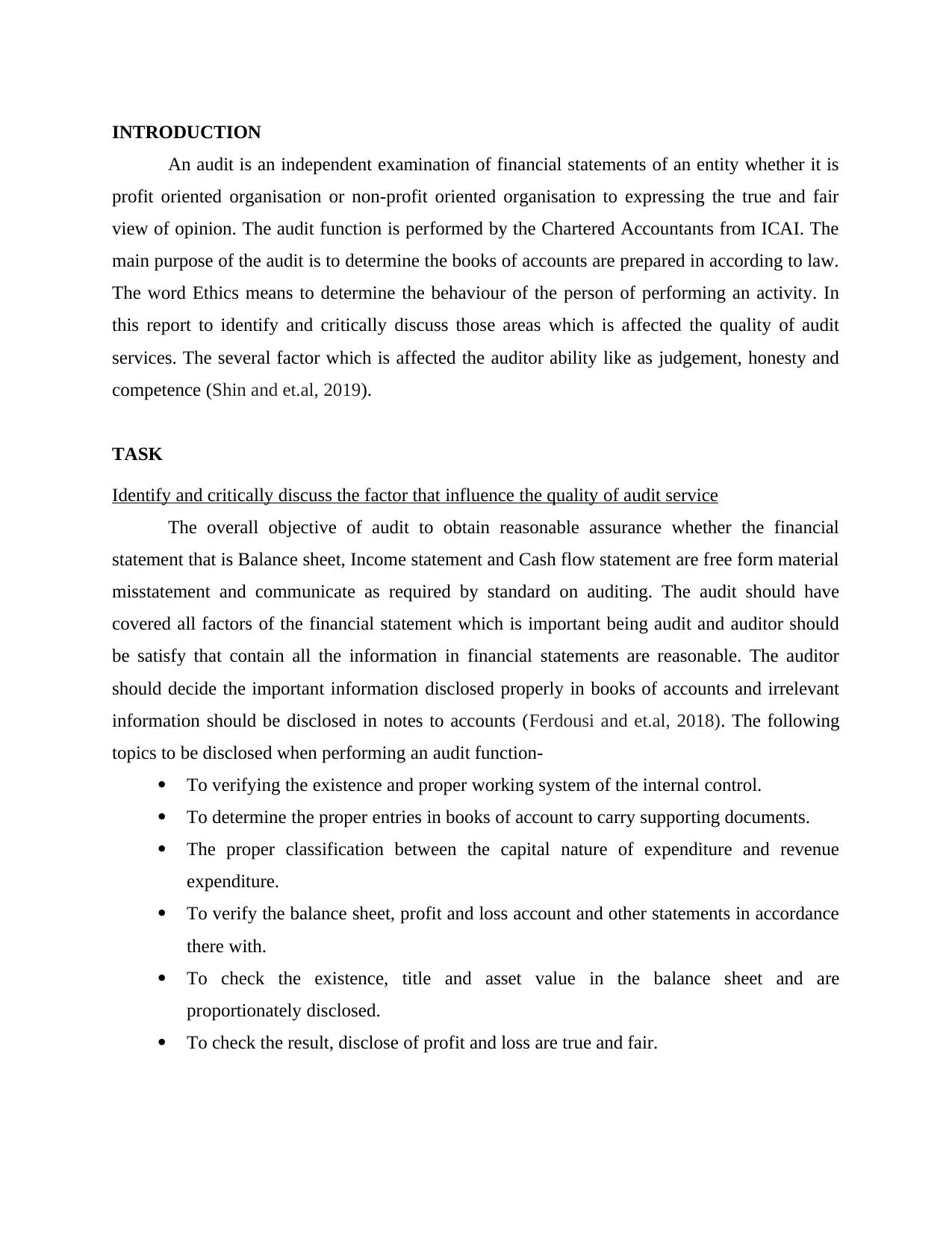
INTRODUCTION
An audit is an independent examination of financial statements of an entity whether it is
profit oriented organisation or non-profit oriented organisation to expressing the true and fair
view of opinion. The audit function is performed by the Chartered Accountants from ICAI. The
main purpose of the audit is to determine the books of accounts are prepared in according to law.
The word Ethics means to determine the behaviour of the person of performing an activity. In
this report to identify and critically discuss those areas which is affected the quality of audit
services. The several factor which is affected the auditor ability like as judgement, honesty and
competence (Shin and et.al, 2019).
TASK
Identify and critically discuss the factor that influence the quality of audit service
The overall objective of audit to obtain reasonable assurance whether the financial
statement that is Balance sheet, Income statement and Cash flow statement are free form material
misstatement and communicate as required by standard on auditing. The audit should have
covered all factors of the financial statement which is important being audit and auditor should
be satisfy that contain all the information in financial statements are reasonable. The auditor
should decide the important information disclosed properly in books of accounts and irrelevant
information should be disclosed in notes to accounts (Ferdousi and et.al, 2018). The following
topics to be disclosed when performing an audit function-
To verifying the existence and proper working system of the internal control.
To determine the proper entries in books of account to carry supporting documents.
The proper classification between the capital nature of expenditure and revenue
expenditure.
To verify the balance sheet, profit and loss account and other statements in accordance
there with.
To check the existence, title and asset value in the balance sheet and are
proportionately disclosed.
To check the result, disclose of profit and loss are true and fair.
An audit is an independent examination of financial statements of an entity whether it is
profit oriented organisation or non-profit oriented organisation to expressing the true and fair
view of opinion. The audit function is performed by the Chartered Accountants from ICAI. The
main purpose of the audit is to determine the books of accounts are prepared in according to law.
The word Ethics means to determine the behaviour of the person of performing an activity. In
this report to identify and critically discuss those areas which is affected the quality of audit
services. The several factor which is affected the auditor ability like as judgement, honesty and
competence (Shin and et.al, 2019).
TASK
Identify and critically discuss the factor that influence the quality of audit service
The overall objective of audit to obtain reasonable assurance whether the financial
statement that is Balance sheet, Income statement and Cash flow statement are free form material
misstatement and communicate as required by standard on auditing. The audit should have
covered all factors of the financial statement which is important being audit and auditor should
be satisfy that contain all the information in financial statements are reasonable. The auditor
should decide the important information disclosed properly in books of accounts and irrelevant
information should be disclosed in notes to accounts (Ferdousi and et.al, 2018). The following
topics to be disclosed when performing an audit function-
To verifying the existence and proper working system of the internal control.
To determine the proper entries in books of account to carry supporting documents.
The proper classification between the capital nature of expenditure and revenue
expenditure.
To verify the balance sheet, profit and loss account and other statements in accordance
there with.
To check the existence, title and asset value in the balance sheet and are
proportionately disclosed.
To check the result, disclose of profit and loss are true and fair.
⊘ This is a preview!⊘
Do you want full access?
Subscribe today to unlock all pages.

Trusted by 1+ million students worldwide
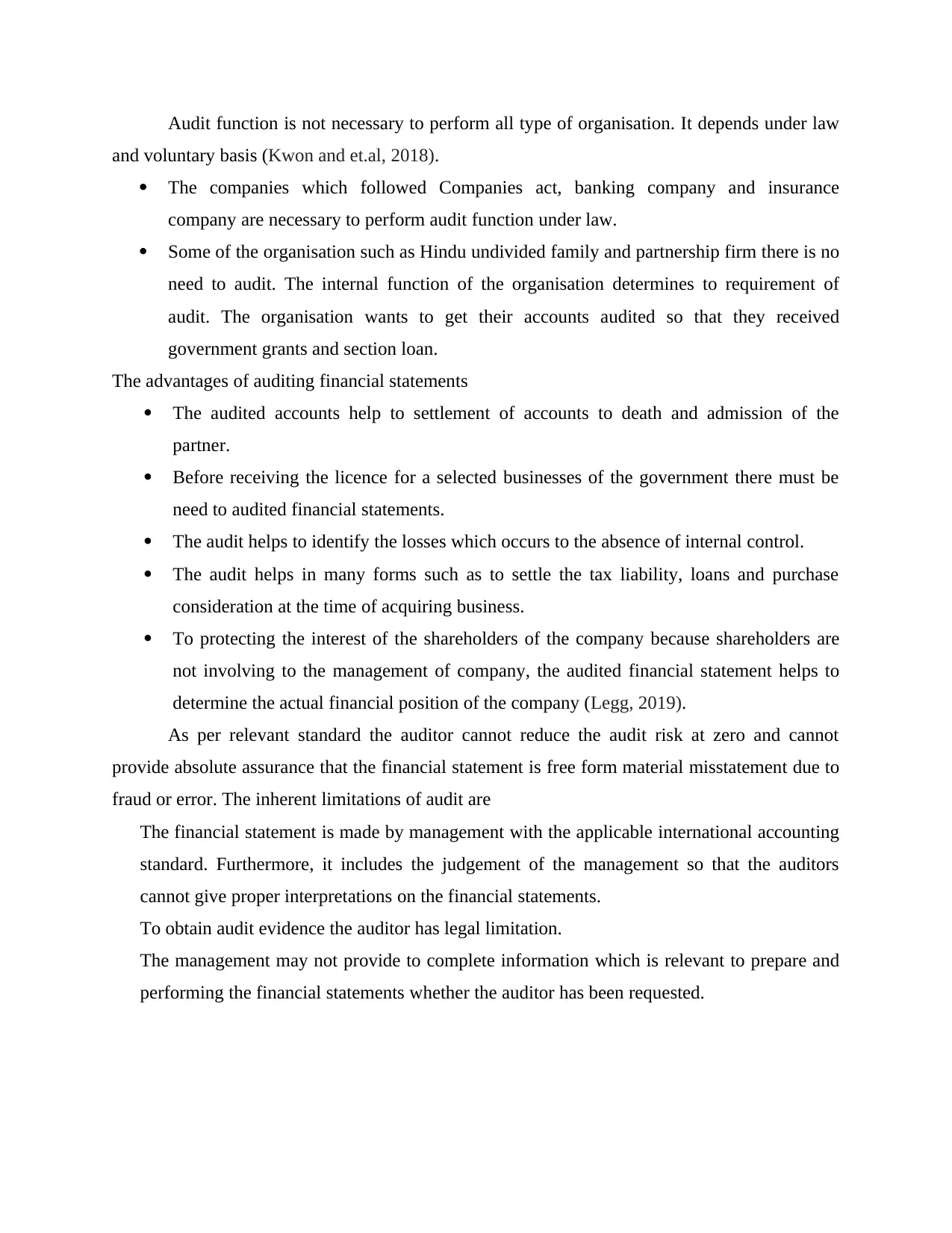
Audit function is not necessary to perform all type of organisation. It depends under law
and voluntary basis (Kwon and et.al, 2018).
The companies which followed Companies act, banking company and insurance
company are necessary to perform audit function under law.
Some of the organisation such as Hindu undivided family and partnership firm there is no
need to audit. The internal function of the organisation determines to requirement of
audit. The organisation wants to get their accounts audited so that they received
government grants and section loan.
The advantages of auditing financial statements
The audited accounts help to settlement of accounts to death and admission of the
partner.
Before receiving the licence for a selected businesses of the government there must be
need to audited financial statements.
The audit helps to identify the losses which occurs to the absence of internal control.
The audit helps in many forms such as to settle the tax liability, loans and purchase
consideration at the time of acquiring business.
To protecting the interest of the shareholders of the company because shareholders are
not involving to the management of company, the audited financial statement helps to
determine the actual financial position of the company (Legg, 2019).
As per relevant standard the auditor cannot reduce the audit risk at zero and cannot
provide absolute assurance that the financial statement is free form material misstatement due to
fraud or error. The inherent limitations of audit are
The financial statement is made by management with the applicable international accounting
standard. Furthermore, it includes the judgement of the management so that the auditors
cannot give proper interpretations on the financial statements.
To obtain audit evidence the auditor has legal limitation.
The management may not provide to complete information which is relevant to prepare and
performing the financial statements whether the auditor has been requested.
and voluntary basis (Kwon and et.al, 2018).
The companies which followed Companies act, banking company and insurance
company are necessary to perform audit function under law.
Some of the organisation such as Hindu undivided family and partnership firm there is no
need to audit. The internal function of the organisation determines to requirement of
audit. The organisation wants to get their accounts audited so that they received
government grants and section loan.
The advantages of auditing financial statements
The audited accounts help to settlement of accounts to death and admission of the
partner.
Before receiving the licence for a selected businesses of the government there must be
need to audited financial statements.
The audit helps to identify the losses which occurs to the absence of internal control.
The audit helps in many forms such as to settle the tax liability, loans and purchase
consideration at the time of acquiring business.
To protecting the interest of the shareholders of the company because shareholders are
not involving to the management of company, the audited financial statement helps to
determine the actual financial position of the company (Legg, 2019).
As per relevant standard the auditor cannot reduce the audit risk at zero and cannot
provide absolute assurance that the financial statement is free form material misstatement due to
fraud or error. The inherent limitations of audit are
The financial statement is made by management with the applicable international accounting
standard. Furthermore, it includes the judgement of the management so that the auditors
cannot give proper interpretations on the financial statements.
To obtain audit evidence the auditor has legal limitation.
The management may not provide to complete information which is relevant to prepare and
performing the financial statements whether the auditor has been requested.
Paraphrase This Document
Need a fresh take? Get an instant paraphrase of this document with our AI Paraphraser
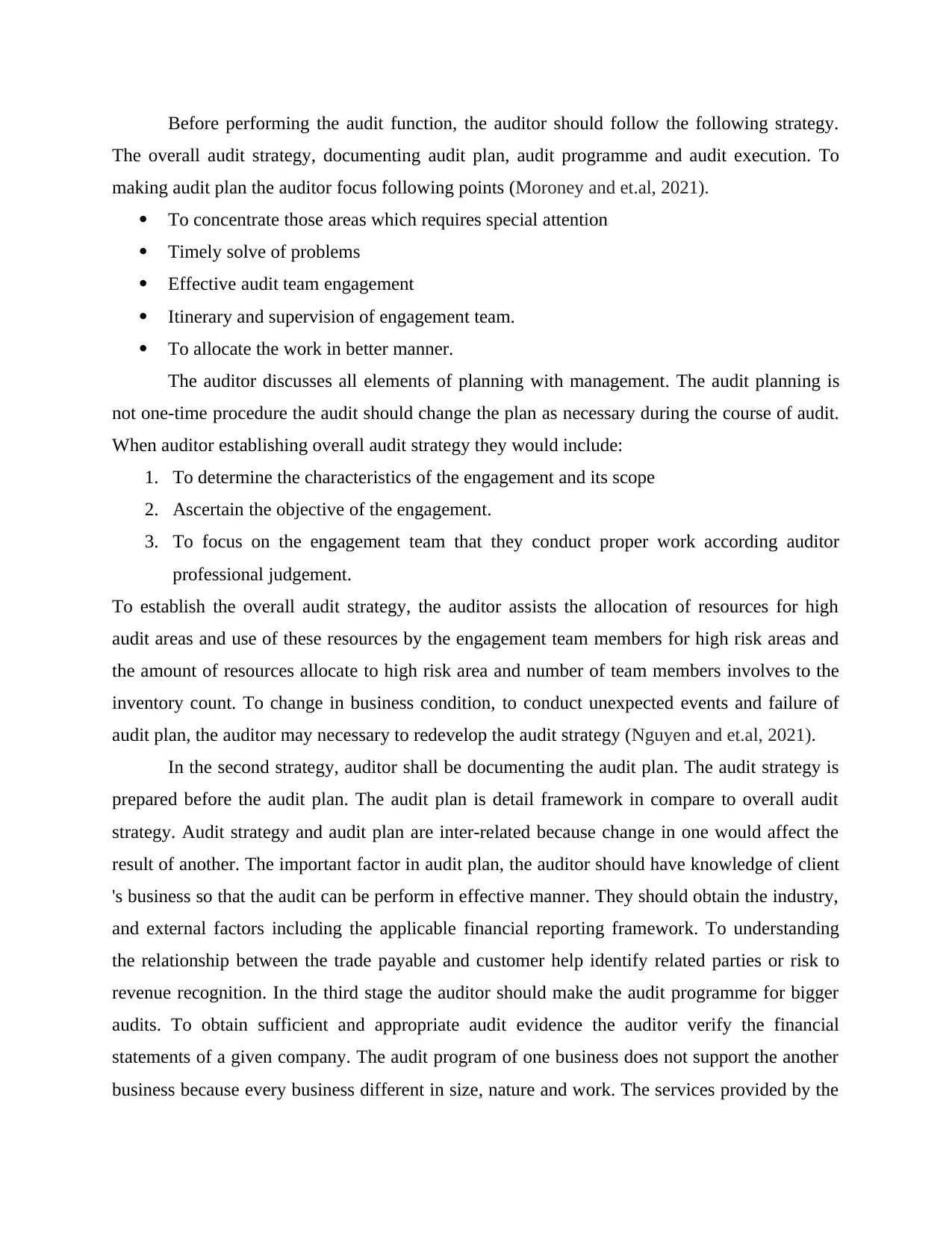
Before performing the audit function, the auditor should follow the following strategy.
The overall audit strategy, documenting audit plan, audit programme and audit execution. To
making audit plan the auditor focus following points (Moroney and et.al, 2021).
To concentrate those areas which requires special attention
Timely solve of problems
Effective audit team engagement
Itinerary and supervision of engagement team.
To allocate the work in better manner.
The auditor discusses all elements of planning with management. The audit planning is
not one-time procedure the audit should change the plan as necessary during the course of audit.
When auditor establishing overall audit strategy they would include:
1. To determine the characteristics of the engagement and its scope
2. Ascertain the objective of the engagement.
3. To focus on the engagement team that they conduct proper work according auditor
professional judgement.
To establish the overall audit strategy, the auditor assists the allocation of resources for high
audit areas and use of these resources by the engagement team members for high risk areas and
the amount of resources allocate to high risk area and number of team members involves to the
inventory count. To change in business condition, to conduct unexpected events and failure of
audit plan, the auditor may necessary to redevelop the audit strategy (Nguyen and et.al, 2021).
In the second strategy, auditor shall be documenting the audit plan. The audit strategy is
prepared before the audit plan. The audit plan is detail framework in compare to overall audit
strategy. Audit strategy and audit plan are inter-related because change in one would affect the
result of another. The important factor in audit plan, the auditor should have knowledge of client
's business so that the audit can be perform in effective manner. They should obtain the industry,
and external factors including the applicable financial reporting framework. To understanding
the relationship between the trade payable and customer help identify related parties or risk to
revenue recognition. In the third stage the auditor should make the audit programme for bigger
audits. To obtain sufficient and appropriate audit evidence the auditor verify the financial
statements of a given company. The audit program of one business does not support the another
business because every business different in size, nature and work. The services provided by the
The overall audit strategy, documenting audit plan, audit programme and audit execution. To
making audit plan the auditor focus following points (Moroney and et.al, 2021).
To concentrate those areas which requires special attention
Timely solve of problems
Effective audit team engagement
Itinerary and supervision of engagement team.
To allocate the work in better manner.
The auditor discusses all elements of planning with management. The audit planning is
not one-time procedure the audit should change the plan as necessary during the course of audit.
When auditor establishing overall audit strategy they would include:
1. To determine the characteristics of the engagement and its scope
2. Ascertain the objective of the engagement.
3. To focus on the engagement team that they conduct proper work according auditor
professional judgement.
To establish the overall audit strategy, the auditor assists the allocation of resources for high
audit areas and use of these resources by the engagement team members for high risk areas and
the amount of resources allocate to high risk area and number of team members involves to the
inventory count. To change in business condition, to conduct unexpected events and failure of
audit plan, the auditor may necessary to redevelop the audit strategy (Nguyen and et.al, 2021).
In the second strategy, auditor shall be documenting the audit plan. The audit strategy is
prepared before the audit plan. The audit plan is detail framework in compare to overall audit
strategy. Audit strategy and audit plan are inter-related because change in one would affect the
result of another. The important factor in audit plan, the auditor should have knowledge of client
's business so that the audit can be perform in effective manner. They should obtain the industry,
and external factors including the applicable financial reporting framework. To understanding
the relationship between the trade payable and customer help identify related parties or risk to
revenue recognition. In the third stage the auditor should make the audit programme for bigger
audits. To obtain sufficient and appropriate audit evidence the auditor verify the financial
statements of a given company. The audit program of one business does not support the another
business because every business different in size, nature and work. The services provided by the
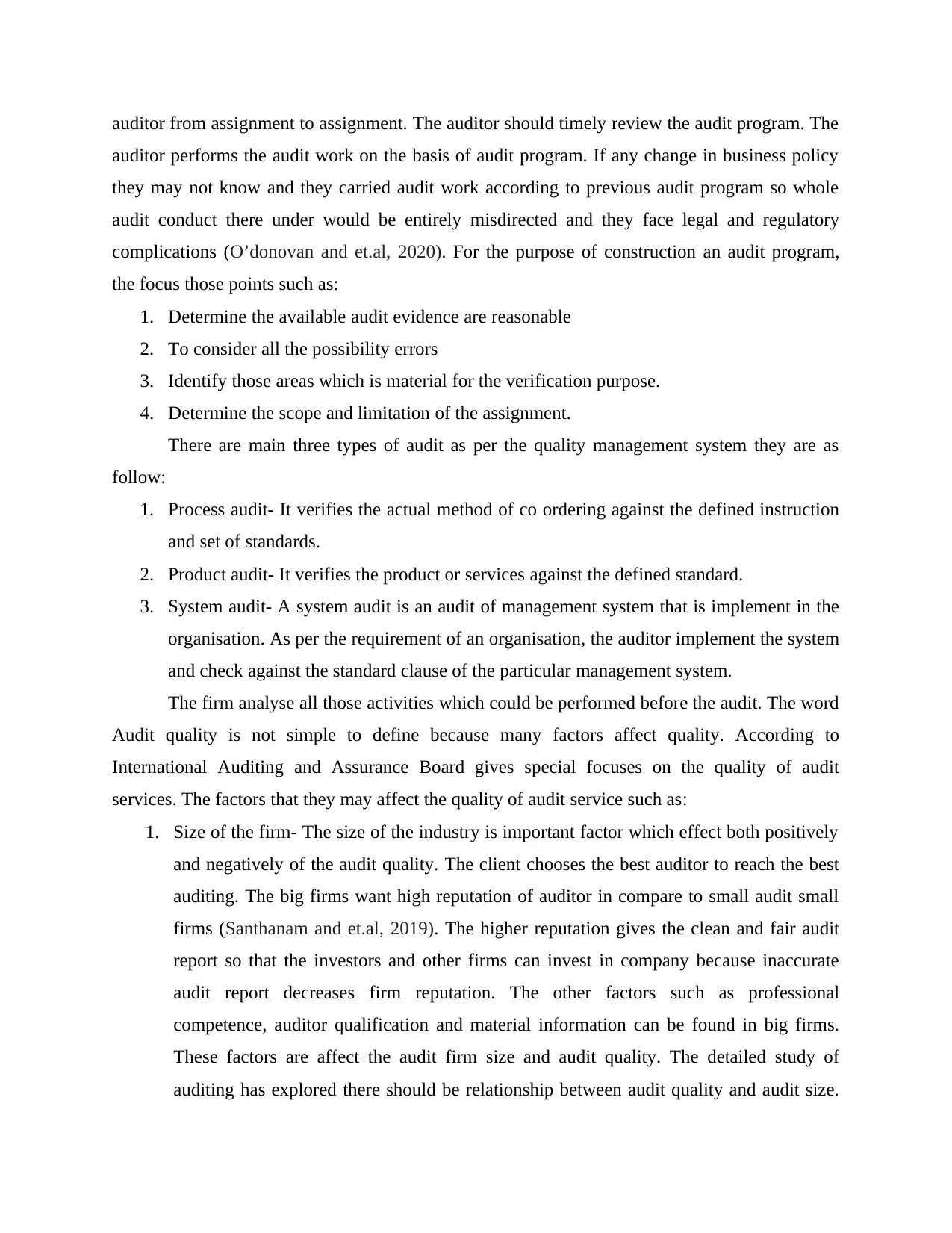
auditor from assignment to assignment. The auditor should timely review the audit program. The
auditor performs the audit work on the basis of audit program. If any change in business policy
they may not know and they carried audit work according to previous audit program so whole
audit conduct there under would be entirely misdirected and they face legal and regulatory
complications (O’donovan and et.al, 2020). For the purpose of construction an audit program,
the focus those points such as:
1. Determine the available audit evidence are reasonable
2. To consider all the possibility errors
3. Identify those areas which is material for the verification purpose.
4. Determine the scope and limitation of the assignment.
There are main three types of audit as per the quality management system they are as
follow:
1. Process audit- It verifies the actual method of co ordering against the defined instruction
and set of standards.
2. Product audit- It verifies the product or services against the defined standard.
3. System audit- A system audit is an audit of management system that is implement in the
organisation. As per the requirement of an organisation, the auditor implement the system
and check against the standard clause of the particular management system.
The firm analyse all those activities which could be performed before the audit. The word
Audit quality is not simple to define because many factors affect quality. According to
International Auditing and Assurance Board gives special focuses on the quality of audit
services. The factors that they may affect the quality of audit service such as:
1. Size of the firm- The size of the industry is important factor which effect both positively
and negatively of the audit quality. The client chooses the best auditor to reach the best
auditing. The big firms want high reputation of auditor in compare to small audit small
firms (Santhanam and et.al, 2019). The higher reputation gives the clean and fair audit
report so that the investors and other firms can invest in company because inaccurate
audit report decreases firm reputation. The other factors such as professional
competence, auditor qualification and material information can be found in big firms.
These factors are affect the audit firm size and audit quality. The detailed study of
auditing has explored there should be relationship between audit quality and audit size.
auditor performs the audit work on the basis of audit program. If any change in business policy
they may not know and they carried audit work according to previous audit program so whole
audit conduct there under would be entirely misdirected and they face legal and regulatory
complications (O’donovan and et.al, 2020). For the purpose of construction an audit program,
the focus those points such as:
1. Determine the available audit evidence are reasonable
2. To consider all the possibility errors
3. Identify those areas which is material for the verification purpose.
4. Determine the scope and limitation of the assignment.
There are main three types of audit as per the quality management system they are as
follow:
1. Process audit- It verifies the actual method of co ordering against the defined instruction
and set of standards.
2. Product audit- It verifies the product or services against the defined standard.
3. System audit- A system audit is an audit of management system that is implement in the
organisation. As per the requirement of an organisation, the auditor implement the system
and check against the standard clause of the particular management system.
The firm analyse all those activities which could be performed before the audit. The word
Audit quality is not simple to define because many factors affect quality. According to
International Auditing and Assurance Board gives special focuses on the quality of audit
services. The factors that they may affect the quality of audit service such as:
1. Size of the firm- The size of the industry is important factor which effect both positively
and negatively of the audit quality. The client chooses the best auditor to reach the best
auditing. The big firms want high reputation of auditor in compare to small audit small
firms (Santhanam and et.al, 2019). The higher reputation gives the clean and fair audit
report so that the investors and other firms can invest in company because inaccurate
audit report decreases firm reputation. The other factors such as professional
competence, auditor qualification and material information can be found in big firms.
These factors are affect the audit firm size and audit quality. The detailed study of
auditing has explored there should be relationship between audit quality and audit size.
⊘ This is a preview!⊘
Do you want full access?
Subscribe today to unlock all pages.

Trusted by 1+ million students worldwide
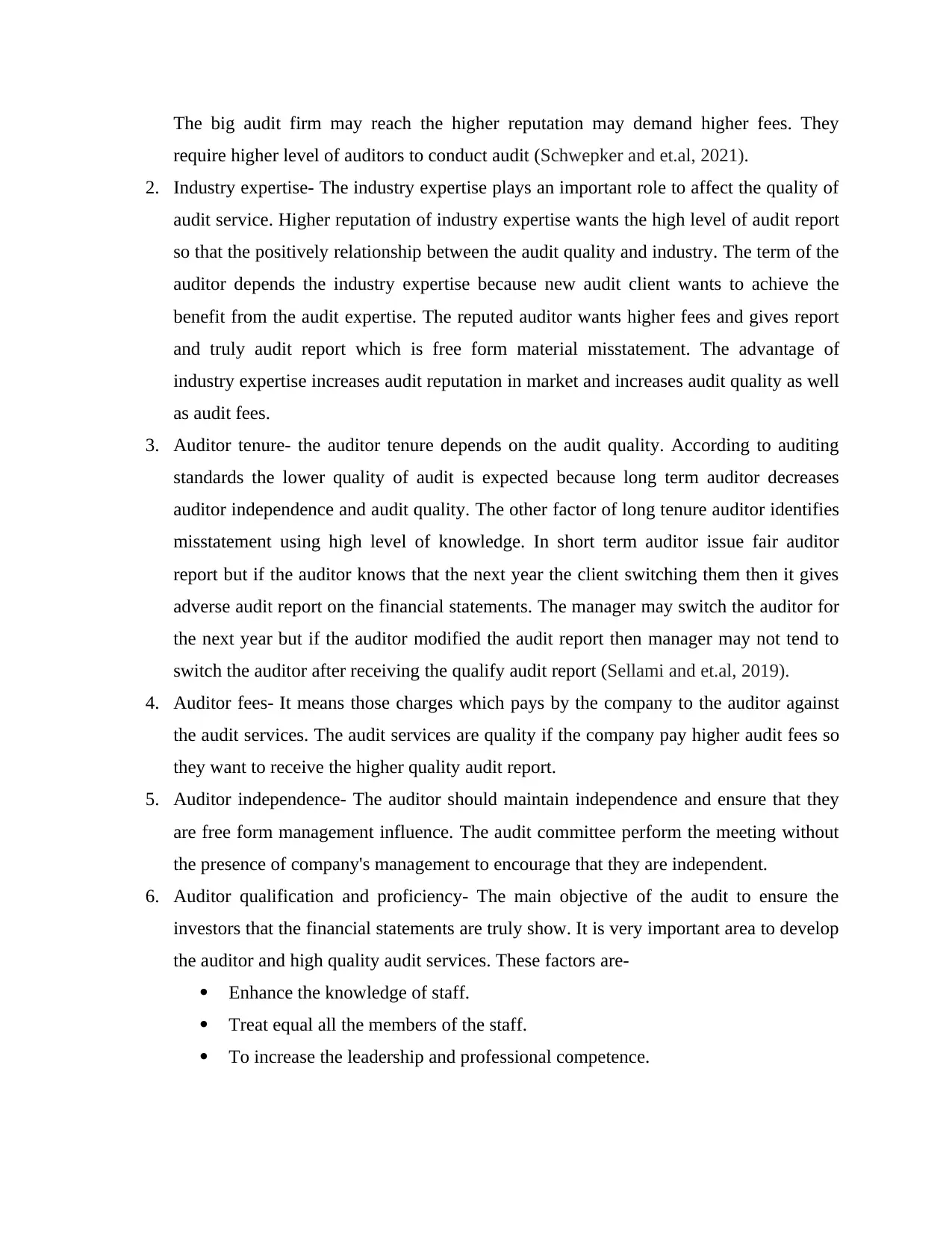
The big audit firm may reach the higher reputation may demand higher fees. They
require higher level of auditors to conduct audit (Schwepker and et.al, 2021).
2. Industry expertise- The industry expertise plays an important role to affect the quality of
audit service. Higher reputation of industry expertise wants the high level of audit report
so that the positively relationship between the audit quality and industry. The term of the
auditor depends the industry expertise because new audit client wants to achieve the
benefit from the audit expertise. The reputed auditor wants higher fees and gives report
and truly audit report which is free form material misstatement. The advantage of
industry expertise increases audit reputation in market and increases audit quality as well
as audit fees.
3. Auditor tenure- the auditor tenure depends on the audit quality. According to auditing
standards the lower quality of audit is expected because long term auditor decreases
auditor independence and audit quality. The other factor of long tenure auditor identifies
misstatement using high level of knowledge. In short term auditor issue fair auditor
report but if the auditor knows that the next year the client switching them then it gives
adverse audit report on the financial statements. The manager may switch the auditor for
the next year but if the auditor modified the audit report then manager may not tend to
switch the auditor after receiving the qualify audit report (Sellami and et.al, 2019).
4. Auditor fees- It means those charges which pays by the company to the auditor against
the audit services. The audit services are quality if the company pay higher audit fees so
they want to receive the higher quality audit report.
5. Auditor independence- The auditor should maintain independence and ensure that they
are free form management influence. The audit committee perform the meeting without
the presence of company's management to encourage that they are independent.
6. Auditor qualification and proficiency- The main objective of the audit to ensure the
investors that the financial statements are truly show. It is very important area to develop
the auditor and high quality audit services. These factors are-
Enhance the knowledge of staff.
Treat equal all the members of the staff.
To increase the leadership and professional competence.
require higher level of auditors to conduct audit (Schwepker and et.al, 2021).
2. Industry expertise- The industry expertise plays an important role to affect the quality of
audit service. Higher reputation of industry expertise wants the high level of audit report
so that the positively relationship between the audit quality and industry. The term of the
auditor depends the industry expertise because new audit client wants to achieve the
benefit from the audit expertise. The reputed auditor wants higher fees and gives report
and truly audit report which is free form material misstatement. The advantage of
industry expertise increases audit reputation in market and increases audit quality as well
as audit fees.
3. Auditor tenure- the auditor tenure depends on the audit quality. According to auditing
standards the lower quality of audit is expected because long term auditor decreases
auditor independence and audit quality. The other factor of long tenure auditor identifies
misstatement using high level of knowledge. In short term auditor issue fair auditor
report but if the auditor knows that the next year the client switching them then it gives
adverse audit report on the financial statements. The manager may switch the auditor for
the next year but if the auditor modified the audit report then manager may not tend to
switch the auditor after receiving the qualify audit report (Sellami and et.al, 2019).
4. Auditor fees- It means those charges which pays by the company to the auditor against
the audit services. The audit services are quality if the company pay higher audit fees so
they want to receive the higher quality audit report.
5. Auditor independence- The auditor should maintain independence and ensure that they
are free form management influence. The audit committee perform the meeting without
the presence of company's management to encourage that they are independent.
6. Auditor qualification and proficiency- The main objective of the audit to ensure the
investors that the financial statements are truly show. It is very important area to develop
the auditor and high quality audit services. These factors are-
Enhance the knowledge of staff.
Treat equal all the members of the staff.
To increase the leadership and professional competence.
Paraphrase This Document
Need a fresh take? Get an instant paraphrase of this document with our AI Paraphraser
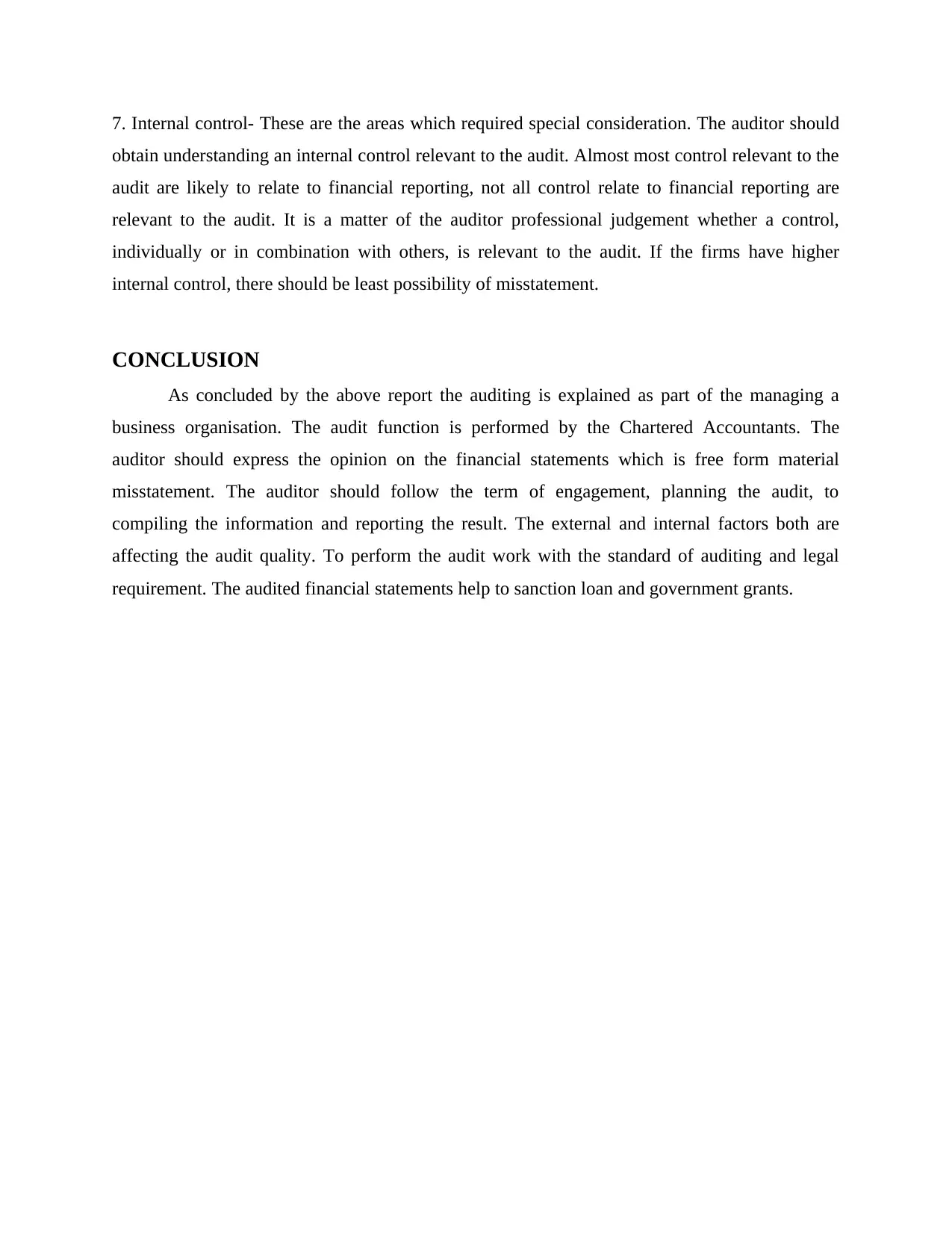
7. Internal control- These are the areas which required special consideration. The auditor should
obtain understanding an internal control relevant to the audit. Almost most control relevant to the
audit are likely to relate to financial reporting, not all control relate to financial reporting are
relevant to the audit. It is a matter of the auditor professional judgement whether a control,
individually or in combination with others, is relevant to the audit. If the firms have higher
internal control, there should be least possibility of misstatement.
CONCLUSION
As concluded by the above report the auditing is explained as part of the managing a
business organisation. The audit function is performed by the Chartered Accountants. The
auditor should express the opinion on the financial statements which is free form material
misstatement. The auditor should follow the term of engagement, planning the audit, to
compiling the information and reporting the result. The external and internal factors both are
affecting the audit quality. To perform the audit work with the standard of auditing and legal
requirement. The audited financial statements help to sanction loan and government grants.
obtain understanding an internal control relevant to the audit. Almost most control relevant to the
audit are likely to relate to financial reporting, not all control relate to financial reporting are
relevant to the audit. It is a matter of the auditor professional judgement whether a control,
individually or in combination with others, is relevant to the audit. If the firms have higher
internal control, there should be least possibility of misstatement.
CONCLUSION
As concluded by the above report the auditing is explained as part of the managing a
business organisation. The audit function is performed by the Chartered Accountants. The
auditor should express the opinion on the financial statements which is free form material
misstatement. The auditor should follow the term of engagement, planning the audit, to
compiling the information and reporting the result. The external and internal factors both are
affecting the audit quality. To perform the audit work with the standard of auditing and legal
requirement. The audited financial statements help to sanction loan and government grants.
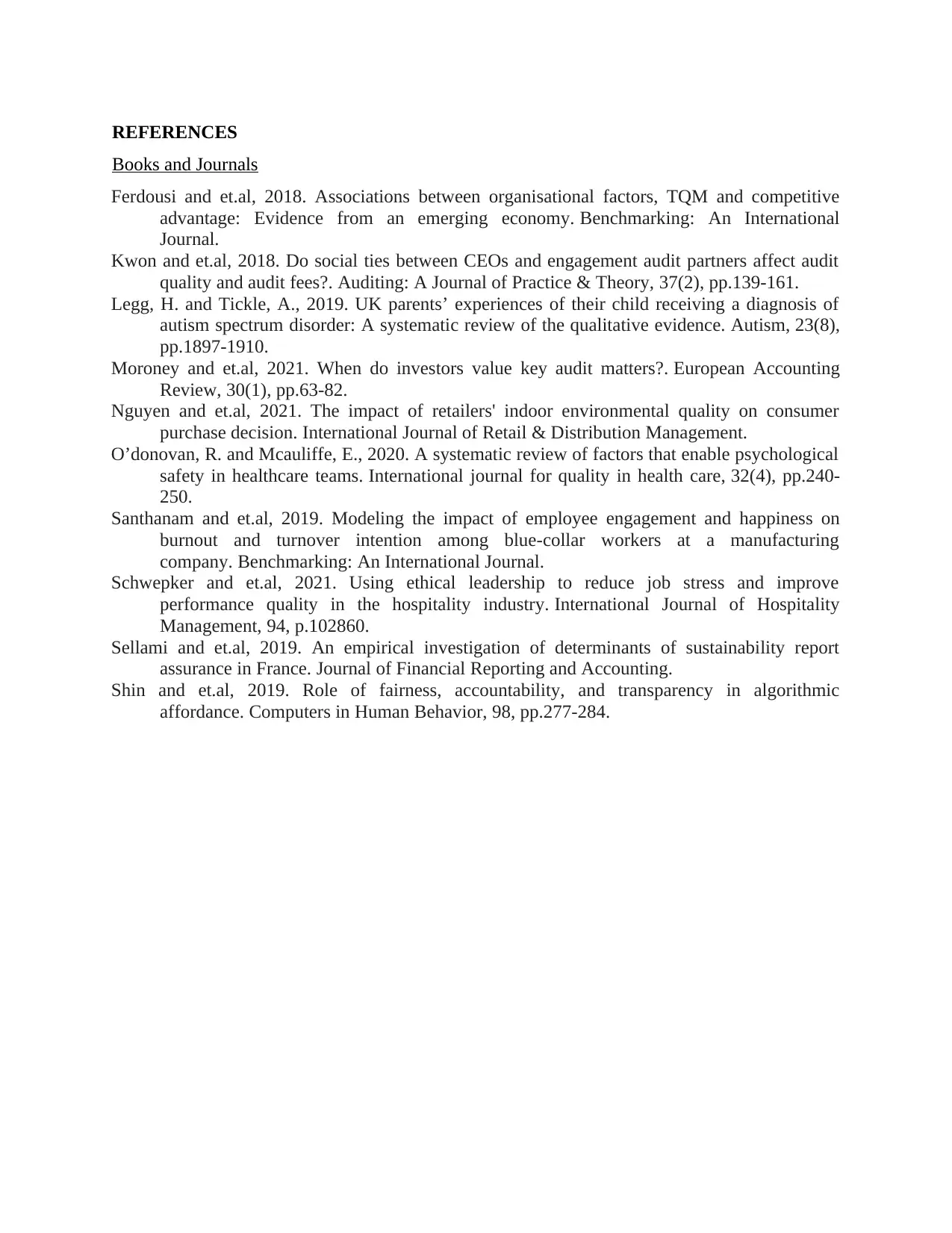
REFERENCES
Books and Journals
Ferdousi and et.al, 2018. Associations between organisational factors, TQM and competitive
advantage: Evidence from an emerging economy. Benchmarking: An International
Journal.
Kwon and et.al, 2018. Do social ties between CEOs and engagement audit partners affect audit
quality and audit fees?. Auditing: A Journal of Practice & Theory, 37(2), pp.139-161.
Legg, H. and Tickle, A., 2019. UK parents’ experiences of their child receiving a diagnosis of
autism spectrum disorder: A systematic review of the qualitative evidence. Autism, 23(8),
pp.1897-1910.
Moroney and et.al, 2021. When do investors value key audit matters?. European Accounting
Review, 30(1), pp.63-82.
Nguyen and et.al, 2021. The impact of retailers' indoor environmental quality on consumer
purchase decision. International Journal of Retail & Distribution Management.
O’donovan, R. and Mcauliffe, E., 2020. A systematic review of factors that enable psychological
safety in healthcare teams. International journal for quality in health care, 32(4), pp.240-
250.
Santhanam and et.al, 2019. Modeling the impact of employee engagement and happiness on
burnout and turnover intention among blue-collar workers at a manufacturing
company. Benchmarking: An International Journal.
Schwepker and et.al, 2021. Using ethical leadership to reduce job stress and improve
performance quality in the hospitality industry. International Journal of Hospitality
Management, 94, p.102860.
Sellami and et.al, 2019. An empirical investigation of determinants of sustainability report
assurance in France. Journal of Financial Reporting and Accounting.
Shin and et.al, 2019. Role of fairness, accountability, and transparency in algorithmic
affordance. Computers in Human Behavior, 98, pp.277-284.
Books and Journals
Ferdousi and et.al, 2018. Associations between organisational factors, TQM and competitive
advantage: Evidence from an emerging economy. Benchmarking: An International
Journal.
Kwon and et.al, 2018. Do social ties between CEOs and engagement audit partners affect audit
quality and audit fees?. Auditing: A Journal of Practice & Theory, 37(2), pp.139-161.
Legg, H. and Tickle, A., 2019. UK parents’ experiences of their child receiving a diagnosis of
autism spectrum disorder: A systematic review of the qualitative evidence. Autism, 23(8),
pp.1897-1910.
Moroney and et.al, 2021. When do investors value key audit matters?. European Accounting
Review, 30(1), pp.63-82.
Nguyen and et.al, 2021. The impact of retailers' indoor environmental quality on consumer
purchase decision. International Journal of Retail & Distribution Management.
O’donovan, R. and Mcauliffe, E., 2020. A systematic review of factors that enable psychological
safety in healthcare teams. International journal for quality in health care, 32(4), pp.240-
250.
Santhanam and et.al, 2019. Modeling the impact of employee engagement and happiness on
burnout and turnover intention among blue-collar workers at a manufacturing
company. Benchmarking: An International Journal.
Schwepker and et.al, 2021. Using ethical leadership to reduce job stress and improve
performance quality in the hospitality industry. International Journal of Hospitality
Management, 94, p.102860.
Sellami and et.al, 2019. An empirical investigation of determinants of sustainability report
assurance in France. Journal of Financial Reporting and Accounting.
Shin and et.al, 2019. Role of fairness, accountability, and transparency in algorithmic
affordance. Computers in Human Behavior, 98, pp.277-284.
⊘ This is a preview!⊘
Do you want full access?
Subscribe today to unlock all pages.

Trusted by 1+ million students worldwide
1 out of 9
Related Documents
Your All-in-One AI-Powered Toolkit for Academic Success.
+13062052269
info@desklib.com
Available 24*7 on WhatsApp / Email
![[object Object]](/_next/static/media/star-bottom.7253800d.svg)
Unlock your academic potential
Copyright © 2020–2026 A2Z Services. All Rights Reserved. Developed and managed by ZUCOL.





